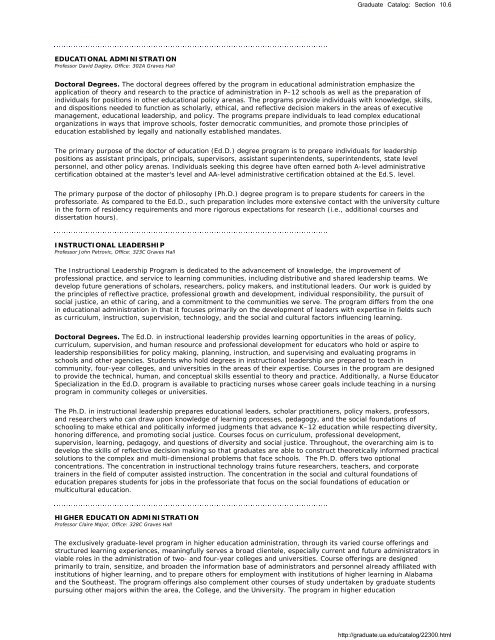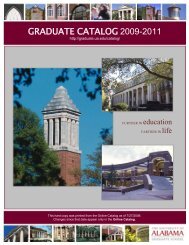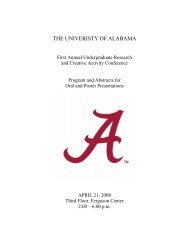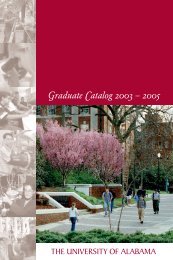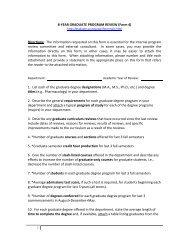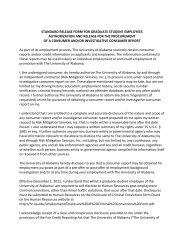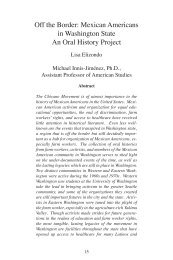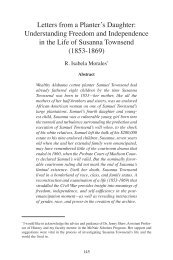2007-09 - Graduate School - The University of Alabama
2007-09 - Graduate School - The University of Alabama
2007-09 - Graduate School - The University of Alabama
Create successful ePaper yourself
Turn your PDF publications into a flip-book with our unique Google optimized e-Paper software.
<strong>Graduate</strong> Catalog: Section 10.6http://graduate.ua.edu/catalog/22300.htmlEDUCATIONAL ADMINISTRATIONPr<strong>of</strong>essor David Dagley, Office: 302A Graves HallDoctoral Degrees. <strong>The</strong> doctoral degrees <strong>of</strong>fered by the program in educational administration emphasize theapplication <strong>of</strong> theory and research to the practice <strong>of</strong> administration in P–12 schools as well as the preparation <strong>of</strong>individuals for positions in other educational policy arenas. <strong>The</strong> programs provide individuals with knowledge, skills,and dispositions needed to function as scholarly, ethical, and reflective decision makers in the areas <strong>of</strong> executivemanagement, educational leadership, and policy. <strong>The</strong> programs prepare individuals to lead complex educationalorganizations in ways that improve schools, foster democratic communities, and promote those principles <strong>of</strong>education established by legally and nationally established mandates.<strong>The</strong> primary purpose <strong>of</strong> the doctor <strong>of</strong> education (Ed.D.) degree program is to prepare individuals for leadershippositions as assistant principals, principals, supervisors, assistant superintendents, superintendents, state levelpersonnel, and other policy arenas. Individuals seeking this degree have <strong>of</strong>ten earned both A-level administrativecertification obtained at the master's level and AA-level administrative certification obtained at the Ed.S. level.<strong>The</strong> primary purpose <strong>of</strong> the doctor <strong>of</strong> philosophy (Ph.D.) degree program is to prepare students for careers in thepr<strong>of</strong>essoriate. As compared to the Ed.D., such preparation includes more extensive contact with the university culturein the form <strong>of</strong> residency requirements and more rigorous expectations for research (i.e., additional courses anddissertation hours).INSTRUCTIONAL LEADERSHIPPr<strong>of</strong>essor John Petrovic, Office: 323C Graves Hall<strong>The</strong> Instructional Leadership Program is dedicated to the advancement <strong>of</strong> knowledge, the improvement <strong>of</strong>pr<strong>of</strong>essional practice, and service to learning communities, including distributive and shared leadership teams. Wedevelop future generations <strong>of</strong> scholars, researchers, policy makers, and institutional leaders. Our work is guided bythe principles <strong>of</strong> reflective practice, pr<strong>of</strong>essional growth and development, individual responsibility, the pursuit <strong>of</strong>social justice, an ethic <strong>of</strong> caring, and a commitment to the communities we serve. <strong>The</strong> program differs from the onein educational administration in that it focuses primarily on the development <strong>of</strong> leaders with expertise in fields suchas curriculum, instruction, supervision, technology, and the social and cultural factors influencing learning.Doctoral Degrees. <strong>The</strong> Ed.D. in instructional leadership provides learning opportunities in the areas <strong>of</strong> policy,curriculum, supervision, and human resource and pr<strong>of</strong>essional development for educators who hold or aspire toleadership responsibilities for policy making, planning, instruction, and supervising and evaluating programs inschools and other agencies. Students who hold degrees in instructional leadership are prepared to teach incommunity, four-year colleges, and universities in the areas <strong>of</strong> their expertise. Courses in the program are designedto provide the technical, human, and conceptual skills essential to theory and practice. Additionally, a Nurse EducatorSpecialization in the Ed.D. program is available to practicing nurses whose career goals include teaching in a nursingprogram in community colleges or universities.<strong>The</strong> Ph.D. in instructional leadership prepares educational leaders, scholar practitioners, policy makers, pr<strong>of</strong>essors,and researchers who can draw upon knowledge <strong>of</strong> learning processes, pedagogy, and the social foundations <strong>of</strong>schooling to make ethical and politically informed judgments that advance K–12 education while respecting diversity,honoring difference, and promoting social justice. Courses focus on curriculum, pr<strong>of</strong>essional development,supervision, learning, pedagogy, and questions <strong>of</strong> diversity and social justice. Throughout, the overarching aim is todevelop the skills <strong>of</strong> reflective decision making so that graduates are able to construct theoretically informed practicalsolutions to the complex and multi-dimensional problems that face schools. <strong>The</strong> Ph.D. <strong>of</strong>fers two optionalconcentrations. <strong>The</strong> concentration in instructional technology trains future researchers, teachers, and corporatetrainers in the field <strong>of</strong> computer assisted instruction. <strong>The</strong> concentration in the social and cultural foundations <strong>of</strong>education prepares students for jobs in the pr<strong>of</strong>essoriate that focus on the social foundations <strong>of</strong> education ormulticultural education.HIGHER EDUCATION ADMINISTRATIONPr<strong>of</strong>essor Claire Major, Office: 328C Graves Hall<strong>The</strong> exclusively graduate-level program in higher education administration, through its varied course <strong>of</strong>ferings andstructured learning experiences, meaningfully serves a broad clientele, especially current and future administrators inviable roles in the administration <strong>of</strong> two- and four-year colleges and universities. Course <strong>of</strong>ferings are designedprimarily to train, sensitize, and broaden the information base <strong>of</strong> administrators and personnel already affiliated withinstitutions <strong>of</strong> higher learning, and to prepare others for employment with institutions <strong>of</strong> higher learning in <strong>Alabama</strong>and the Southeast. <strong>The</strong> program <strong>of</strong>ferings also complement other courses <strong>of</strong> study undertaken by graduate studentspursuing other majors within the area, the College, and the <strong>University</strong>. <strong>The</strong> program in higher education


